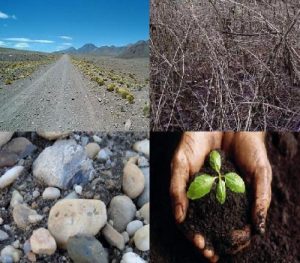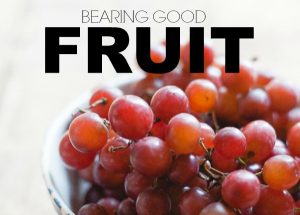In Matthew 13:22-24, Jesus talk about he fourth soil in the Parable of the Four Soils, and says that only this fourth soil produces good fruit. Does this parable show us how to tell true Christians from false Christians, or how to know who truly has eternal life? No! Not at all. Listen to the study to see what Jesus IS teaching and why this is important for properly understanding the gospel.
 This study is an excerpt from my Gospel Dictionary online course. This course considers 52 key words of the Gospel and thousands of biblical texts. The course contains over 100 hours Bible teaching. You can take the course by joining my online discipleship group.
This study is an excerpt from my Gospel Dictionary online course. This course considers 52 key words of the Gospel and thousands of biblical texts. The course contains over 100 hours Bible teaching. You can take the course by joining my online discipleship group.
What is the Meaning of Matthew 13:22-23 (Luke 8:14)
Now he who received seed among the thorns is he who hears the word, and the cares of this world and the deceitfulness of riches choke the word, and he becomes unfruitful. But he who received seed on the good ground is he who hears the word and understands it, who indeed bears fruit and produces: some a hundredfold, some sixty, some thirty (Matthew 13:22-23).
Many use the Parable of the Four Soils in Matthew 13:3-23 and Luke 8:4-15 as evidence that all true Christians will bear fruit. This understanding is largely due to the use of the word “saved” in Luke 8:12. Many believe and teach that in order to truly be “saved,” people must not only believe, but also have many good works (or fruit) to provide evidence of their salvation.
But this explanation is based upon a misunderstanding of three key terms in the text. To properly understand the Parable of the Four Soils, it is critically important to properly define the terms kingdom of heaven, salvation, and fruit.
The Kingdom of Heaven
The term “kingdom of heaven” does not refer to heaven itself, or to going to heaven when we die, but instead refers to the rule and reign of God here on earth now. Those who enter into the kingdom, inherit the kingdom, or experience the kingdom are those who live in light of God’s way of doing things on this earth so that they can know the blessing, joy, and fulfillment of God’s reign in their life now.
Salvation
Similarly, the term salvation (or saved) does not refer to justification or receiving eternal life. Instead, it means “deliverance” and the context determines while kind of deliverance is in view.

In this case, those who hear the teachings of Jesus and live in light of them can be delivered from a worthless and pointless existence on earth and instead experience the opposite, which is life in the kingdom of God. The cares and troubles of this world steal away the joys of the reign of God, and we can choose which one we experience by how we respond to the teachings of Jesus.
Fruit
These two terms helps us understand the word fruit.

In this context, while the word can refer to correct teaching about God and Scripture which is heard, understood, and taught to others, the term can also refer to good works and a life of fulfillment and joy that comes from following God’s instructions on how to live. The Word of God contains instructions for how we can live the best life possible, and if we hear, understand, and obey these instructions, our lives will produce a great harvest of blessings for ourselves and others (Matt 13:23).
Jesus is teaching that if you want to have a productive life, the ways of this world will lead you into emptiness and deadness, but His ways will lead to a fulfilling and profitable life full of satisfaction and significance.
It is important to note once again that the presence or absence of fruit in the life some other person is not indicative one way or the other about that person’s eternal destiny. Any individual, whether a believer or an unbeliever, can be any of the four soils in this parable.
Just as it is entirely possible for a true and genuine child of God to allow the devil to snatch away the truths of Scripture from his heart before they can take root or to allow the cares and worries of this world to choke out the promises of Scripture, so also, any unbeliever can see the wisdom in the teachings of Scripture and decide to patterns their lives after these teachings.
Does the Parable of the Four Soils Tell Us who is a Christian?
So the Parable of the Four Soils has nothing to do with whether or not someone has eternal life. It instead describes the four ways that all people—believers or unbelievers alike—might respond to the teaching of Scripture.
 While the term fruit can refer to good works, even when it does, these good works cannot be used to determine whether or not a person has eternal life.
While the term fruit can refer to good works, even when it does, these good works cannot be used to determine whether or not a person has eternal life.
They might be helpful in determining whether or not a person is following the teachings of Scripture, but since anybody can follow accept and apply Scripture to their life and experience the positive consequences as a result, we must not think that such obedience to Scripture (or a lack of obedience) provides evidence about who is truly justified and who is not.
Even when the fruit of good works can be seen in someone else’s life, such fruit does not help us see into their heart for whether or not they have believed in Jesus for eternal life.
 Understanding the Gospel requires us to properly understand the key words and terms of the Gospel. Take my course, "The Gospel Dictionary" to learn about the 52 key words of the Gospel, and hundreds of Bible passages that use these words.
Understanding the Gospel requires us to properly understand the key words and terms of the Gospel. Take my course, "The Gospel Dictionary" to learn about the 52 key words of the Gospel, and hundreds of Bible passages that use these words.
This course costs $297, but when you join the Discipleship group, you can to take the entire course for free.



